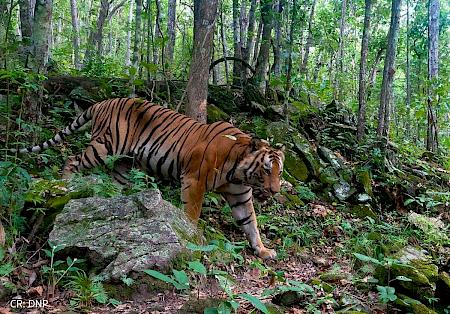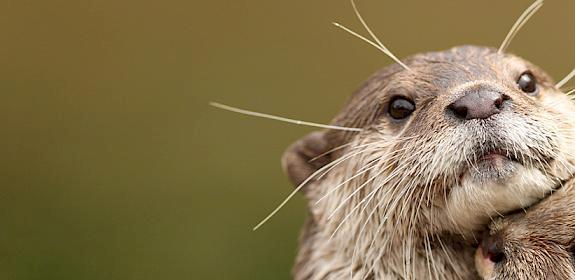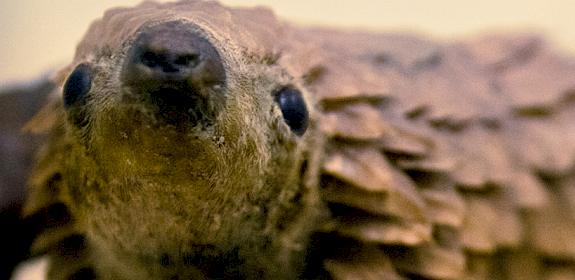Thais urged to pledge against buying and owning ivory and tiger amulets under new ‘Mercy is Power’ campaign
Demand for elephant ivory and tiger products is a significant driver of the illegal wildlife trade, but a new campaign is encouraging Thais to join celebrities and social influencers like Cherry-Khemupsorn and Wannasingh Prasertkul in a bid to prevent further detriment to these species.

‘Mercy is Power’ is a joint campaign between TRAFFIC, the Department of National Parks, Wildlife and Plant Conservation (DNP) and the United Nations Development Programme (UNDP) with support from the Global Environment Facility.
The campaign challenges the widely held belief in Thailand that buying or possessing an elephant ivory or tiger amulet can make life better. As per Buddhist teachings, success and progress in life are from one’s own hard work and strong will. Real power comes not from possessing products that require the killing of animals but by showing them mercy and not buying animal products.
People can make a pledge on mercyispower.com against buying and owning ivory and tiger amulets and receive a personalised e-yantra11 in return.
Our mission is to conserve, promote and restore forest resources, wildlife and plant species in forest areas for conservation. I believe the campaign will succeed in getting people to rethink and change their attitudes and behaviours towards the use of ivory and tiger amulets. This directly contributes to our effort to combat illegal wildlife trade.”
Thanya Netithammakun, Director General of the DNP
It is illegal to possess ivory unless products were registered to the owners in 2015 or before. Anyone in ownership of unregistered ivory and tiger products after this period is considered illegal based on the new Wildlife Preservation and Protection Act (WARPA) of 2019. This replaced a former WARPA and increased penalties, both in imprisonment and fine.
The best approach to achieving long-term impact is to reduce demand for wildlife products and do it creatively, alongside law enforcement. This campaign incorporates social power and storytelling to question whether buying or owning tiger parts and elephant ivory that come from killing animals can create good luck, success and power. With the launch of the campaign, we are thrilled with the strong support from monks, leading Thai celebrities, social media influencers and our partners – together we can achieve success.”
Dararat Weerapong, TRAFFIC Senior Project Manager

TRAFFIC's analysis of 32 countries and territories found 369 tigers were seized from 49 incidents in Thailand between 2000 and 2018. A further 24 tigers were seized in six incidents in the country up until 2020. TRAFFIC monitored the ivory trade online in 2019 and found that more than 1,000 ivory items were found for sale online in Thailand over just five days in the snapshot survey.
Social norms around wildlife products are evolving. More people are beginning to understand that buying or owning these products has a direct negative impact on wildlife conservation and see it as increasingly socially unacceptable. Demand reduction efforts can help end illegal wildlife trade and thereby conserve endangered species. By launching the ‘Mercy is Power’ campaign together with TRAFFIC and the DNP, we can reinforce this positive trend and hopefully end illegal wildlife trade for good."
Renaud Meyer, UNDP Resident Representative to Thailand

Three videos will be distributed via YouTube and Facebook, including a thought-provoking quote from Venerable Napan Santibhaddo, an Assistant Abbot at Wat Saket. The videos will prompt viewers to pledge not to buy or own tiger parts and elephant ivory and to customize and download their own e-yantra from the campaign’s official website, along with the hashtags #MercyisPower.
More than 20 Thai celebrities and social media influencers such as Cherry-Khemupsorn, Patricia Good, Top-Pipat, Noon-Siraphun, Wannasingh Prasertkul and Maria Poonlertlarp have shown their support for the campaign, which will start ahead of World Tiger Day on 29 July 2021.
Notes:
- The campaign plays on the Thai word Yan or yantra, a sheet of paper usually inscribed with drawings, texts, and incantations, which is believed to ward off danger and bring about good luck. The objective of the campaign is to shift people’s spiritual beliefs from tiger and elephant ivory amulets to yantra with tiger and elephant ivory print on it. The campaign uses electronic yantra, which suits the digital lifestyle of Thais. The electronic yantra, generated as part of the campaign, preserves the beliefs of wildlife consumers and can also be owned without taking away the lives of wild elephants and tigers.
The Combating Illegal Wildlife Trade project, focusing on Ivory, Rhino Horn, Tiger and Pangolin in Thailand, aims to reduce the trafficking of these species in Thailand through enhanced enforcement capacity and collaboration and targeted behaviour change campaigns. The project is funded by the Global Environment Facility (GEF) through the Global Wildlife Program (GWP) and United Nations Development Programme (UNDP) in partnership with the Department of National Parks, Wildlife and Plant Conservation, TRAFFIC, the International Union for Conservation of Nature (IUCN) and TRACE.
Department of National Parks, Wildlife and Plant Conservation (DNP) is a Thai government agency with a mandate to 1) conserve, protect and restore forest and wildlife resources; 2) Research, develop and provide academic services; 3) Manage forest and wildlife resources by making contributions based on appropriate technology and 4) Promote the utilisation of natural resources in a balanced and sustainable manner. http://portal.dnp.go.th/Main
Global Environment Facility (GEF) was established on the eve of the 1992 Rio Earth Summit to help tackle our planet’s most pressing environmental problems. Since then, the GEF has provided more than $21.1 billion in grants and mobilised an additional $114 billion in co-financing for more than 5,000 projects in 170 countries. The GEF has provided support to more than 25,000 civil society and community initiatives in 133 countries through its Small Grants Programme. https://www.thegef.org/
Global Wildlife Program (GWP) is funded by the GEF and led by the World Bank. The program includes 37 projects across 32 countries in Africa, Asia, and Latin America, aiming to combat illegal wildlife trade and promote wildlife-based economies. https://www.worldbank.org/en/programs/global-wildlife-program
United Nations Development Programme (UNDP) is the leading United Nations organisation fighting to end the injustice of poverty, inequality, and climate change. Working with our broad network of experts and partners in 170 countries, we help nations build integrated, lasting solutions for people and the planet. Learn more at www.th.undp.org




